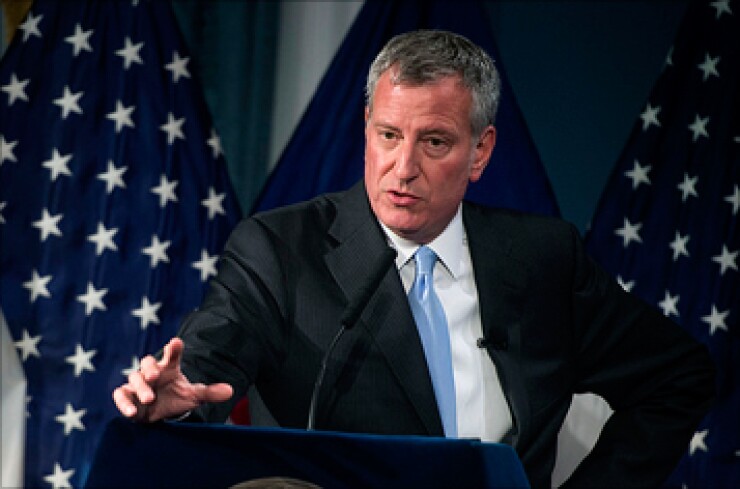
New York Mayor Bill de Blasio acknowledged "deep uncertainty" in the wake of the presidential transition as he released his $84.7 billion preliminary budget for fiscal 2018.
"We can still deepen our investments in the quality of life in this city," de Blasio told reporters Tuesday at the City Hall Blue Room.
The mayor, a Democrat in the final year of his first term, warned of the great unknown at the federal level, given the new presidency of Republican Donald Trump, as well as state-level variables. Targets of possible federal cuts include police, the public health system, educational and environmental protection.
"While we're still waiting for the situation in Washington to develop, we have to keep improving," said de Blasio.
State variables include education. De Blasio is expected to speak before the state legislature in Albany on Monday.
The mayor will make tweaks in his executive budget in the spring following a round of City Council hearings.
By law, the 51-member council must vote on it by July 1, when the new fiscal year starts. Last year's budget was finished a month ahead of schedule.
De Blasio's proposal exceeds the November $83.5 billion spending plan by about $1.2 billion. The budget has risen about 20% since de Blasio took office in January 2014.
He also proposed a 10-year, $89.6 billion capital budget that emphasizes infrastructure.
De Blasio's budget calls for expanding a pilot program to bulletproof police cars, spending $495 million to expand city schools and paving 1,300 miles of roads.
"We have massive infrastructure needs," he said. "Something as simple as paving our roads makes our economy better."
De Blasio is also committing $1 billion in bonding to replace deteriorating roofs on New York City Housing Authority buildings over 10 years. The city also committed $300 million for roof repair in 2015.
Moody's Investors Service rates the city's general obligation bonds Aa2. Fitch Ratings and S&P Global Ratings assign AA ratings.
According to a Moody's commentary on Monday, the city's "diverse, vibrant economy" drives the growth necessary to keep pace with fixed costs. "Fixed costs for debt service, pensions and retiree health care are increasing and healthy economic growth is needed to keep them affordable," Moody's said.
De Blasio budget officials have identified $1.1 billion in preliminary budget savings, with a directive to the Mayor's Office of Management and Budget to find an additional $500 million of savings in the executive budget. The mayor has also identified health-care savings of $3.4 billion through fiscal 2018.
Reserves include $250 million for capital stabilization, $4 billion in a retiree health benefits trust fund and a general reserve of $1 billion a year over four years. "It's the highest ever achieved and highly appropriate," he said.
City economic output exceeds all but three U.S. states and several of the world's largest economies, said Moody's. Its $1 trillion property full value exceeds that of Los Angeles, Chicago and San Diego combined.
All three major bond rating agencies, in reports preceding the city's $850 million GO sale last month, warned about high debt as well as pension and other post-employment benefits liabilities. According to Fitch, they total $135 billion, or about 25% of the city's personal income.
"Large OPEB liabilities are likely to grow," said Fitch, which considers the city's OPEB reserve, now roughly $4 billion, an operating reserve – the so-called health benefit fund -- rather than an offset to the OPEB liability.
The city, said Fitch, has used it that way in the past.
"The reason it's viewed as liquidity is we pay out of that fund each year's expenses and then replenish it," Alan Anders, deputy director for finance for the Mayor's Office of Management and Budget, said on a Bond Buyer podcast.
"The way it's sort of an implicit reserve is that if we ever hit a down cycle in the economy, we have the choice of not replenishing it for one year and going to the second year. But one of the things of the de Blasio administration and [budget director] Dean Fuleihan is that building reserves against bad times is important."
New York has budgeted under generally accepted accounting principles since it emerged from its fiscal crisis of the 1970s.
"It means you can't play any games," said Anders. "You can't be pulling revenues forward and deferring expenses. It's a very strict standard and adds enormously to our credibility."
Speaking Monday to contractors at a New York Building Congress meeting in the Pierre Hotel in Manhattan, de Blasio called on New York State to extend design-build authority to the city. Some infrastructure experts see the design-build procurement mechanism as streamlining the construction process while trimming costs.
"It's something we all know could help us all get a lot done more quickly, but we are going to need your help in Albany," the mayor said. "In some of the areas of the city where the economy is growing the most … the infrastructure hasn't yet caught up."
Gov. Andrew Cuomo's latest budget proposal would grant design-build authority to all state agencies, but not city agencies.





